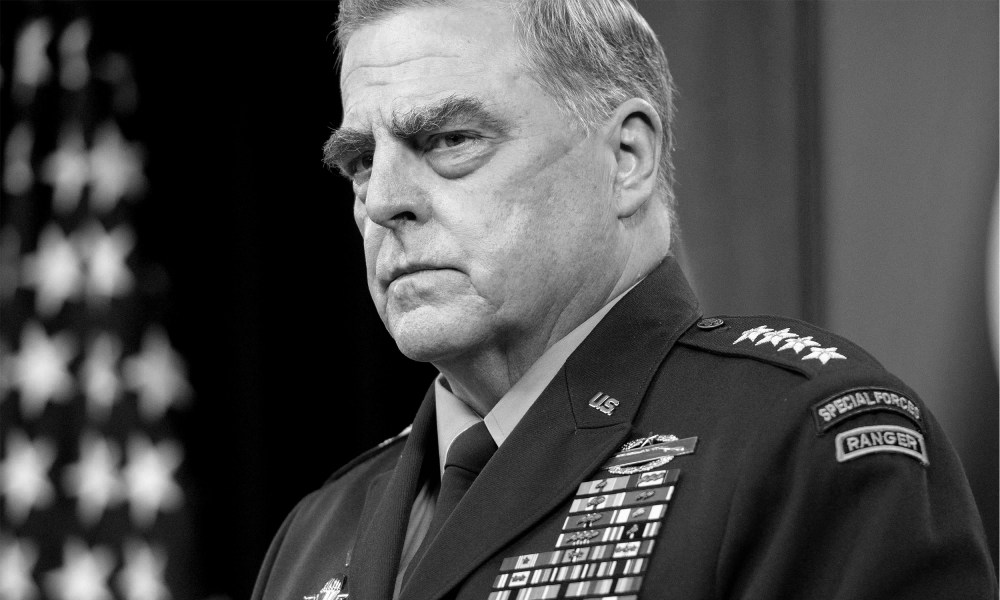Gen. Mark Milley, the chairman of the Joint Chiefs of Staff, has quite the knack for placing himself in the middle of political controversies.
Milley’s latest mess might be the most profound.
Last year, he was forced to publicly apologize after, dressed in full combat fatigues, he accompanied former President Donald Trump on his now-infamous walk across Lafayette Square near the White House grounds, moments after peaceful demonstrators protesting George Floyd’s murder were tear-gassed.
This summer, he got in a spat with Republican Rep. Matt Gaetz, of Florida, at a congressional hearing and then was extensively quoted telling reporters how he allegedly tried to block Trump’s effort to overturn the election on Jan. 6.
But Milley’s latest mess might be the most profound — not because of what it says about him, but in the ways it lays bare the tenuous nature of our democratic institutions.
According to recently released excerpts from the new book “Peril” by Washington Post journalists Bob Woodward and Robert Costa, in fall 2020, Milley became increasingly concerned that Trump was mentally unstable. Milley reportedly sought to prevent Trump from launching a nuclear strike and reached out to a Chinese military leader to reassure him that a U.S. attack against Beijing was not imminent.

His actions have led some prominent Republicans like Sen. Marco Rubio, of Florida, to label his elections as “treasonous” and call on him to resign (in an email to reporters, Trump called Milley a “dumbass.”)
Most of these accusations are hysterical and can be safely ignored. But Milley’s actions raise serious, and in some respects unanswerable, questions about one of the most sacrosanct norms in American democracy — civilian control of the military — and it’s applicability when it comes to an issue like the use of nuclear weapons.
Milley was confronted with a problem that our constitutional system is simply not equipped to handle. He was legitimately concerned that Trump was mentally unstable, in serious decline and might do something incredibly stupid or tragic.
In calling his military counterpart in Beijing, Milley sought to put at ease increasingly anxious Chinese military officials concerned about the possibility of a surprise U.S. military attack. Milley told his counterpart that the “United States was not going to suddenly attack China without any warning — whether it be through diplomatic, administrative or military channels,” according to an Associated Press report on Woodward and Costa’s book.
Milley’s actions raise serious, and in some respects unanswerable, questions about one of the most sacrosanct norms in American democracy.
By all accounts, Milley’s call to the Chinese was not secret, as other key government agencies were informed. Indeed, it appears the impetus for his call in October 2020 came from then-Secretary of Defense Mark Esper. Moreover, Milley was trying to prevent China from miscalculating or overreacting to events in the United States.
Seeking to defuse tensions and avert a dangerous military escalation by Beijing is laudable behavior. It’s on the question of a nuclear strike where things get messy.
Milley reportedly reviewed the procedures for launching nuclear weapons with top military officials, telling them, according to The Washington Post, that “the president alone could give the order — but, crucially, that he, Milley, also had to be involved.”
The problem here is that the president can order a nuclear strike and bypass the chairman of the Joint Chiefs of Staff completely. Milley is not in the chain of command, and by interjecting himself in the process, he risks the appearance that he is putting his judgment above that of the president.
In Milley’s defense, it doesn’t appear that he was actively seeking to overrule the president or telling his staff not to carry out the theoretical order from Trump. Rather, he sought to ensure that any presidential decision to use force would go through proper military procedure. If, for example, a lower-level official concluded that Trump had issued an illegal order — but didn’t have the confidence to disobey — Milley was, in effect, telling all those under his command that he had their back.

It’s also possible that Milley may have inflated the risks of nuclear strike and exaggerated his own role in averting that possibility. As was the case in his supposed efforts to block Trump from overthrowing the election, there’s an argument to be made that Milley was acting as much out of hubris as he was genuine concern.












